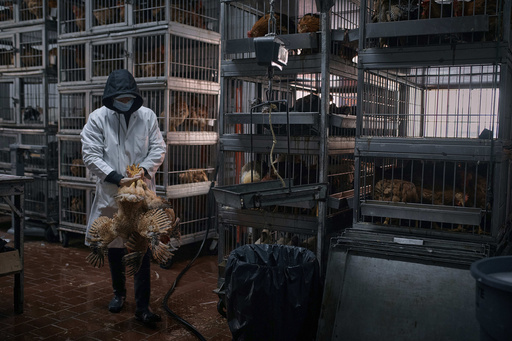NEW YORK — In response to the discovery of seven avian flu cases, live poultry markets in New York City scrambled to liquidate their chicken and fowl inventory on Friday. State authorities have mandated the closure of these markets within the city and its surrounding areas for one week to prevent further spread of the virus.
Governor Kathy Hochul reassured the public that there is currently no significant health risk, emphasizing that this action has been taken as a precautionary measure. Avian flu strains have recently ravaged farms across the country, resulting in the culling of millions of birds and contributing to soaring egg prices. Fortunately, state officials report that no human infections have been identified in New York.
The state’s directive came after inspections uncovered birds infected with avian flu in live bird markets located in the Bronx, Brooklyn, and Queens. The markets have been instructed to safely dispose of their poultry. Meanwhile, bird markets that haven’t reported any cases must sell their remaining stock within three days, undergo cleaning and disinfection, and remain closed for a minimum of five days, pending a state inspection before they can reopen.
At La Granja, a halal poultry market situated in Manhattan’s Harlem area, employees worked furiously to sell about 200 live chickens of various breeds, alongside turkeys, quail, ducks, roosters, pigeons, and rabbits. Owner Jose Fernandez noted that any poultry left unsold would be slaughtered and distributed to employees and regular customers. “We’re going to lose money, for now,” he acknowledged, but added, “the law is the law. They know what they’re doing.”
According to the U.S. Centers for Disease Control and Prevention, the avian flu virus poses a minimal risk to the general population. The agency has recorded a total of 67 human cases of bird flu across the U.S., mostly among farmworkers who have been in close contact with infected poultry or livestock, with symptoms typically mild.
Despite the alarming news around avian flu, business seemed to thrive at some of New York City’s poultry markets on Friday. Customers at the Wallabout Poultry market in Brooklyn formed a line, obtaining numbers before selecting chickens from cramped cages. Workers efficiently weighed the birds upside down before taking them to the backroom for slaughter.
“I’m not worried about any bird flu,” remarked Stan Tara, a Brooklyn resident purchasing a chicken for $22.50. “It’s the same as you buy from the supermarket. A little more expensive, but at least it’s fresh.”
The first U.S. bird flu fatality was reported last month in Louisiana, with health officials stating that the deceased, who was over 65 with preexisting health issues, had been in contact with infected birds in a backyard flock.
The H5N1 strain of avian flu has been prevalent among wild birds, poultry, and even livestock. Authorities are stressing the importance of safety for individuals who might come into contact with sick or deceased birds by recommending the use of personal protective equipment like respiratory masks, goggles, and gloves.
Across the nation, over 156 million birds have been impacted by this outbreak, with many large-scale operations resorting to slaughter their entire flocks to control the spread.
Animal rights organizations have voiced their concerns regarding the state’s decision to permit continued sales at poultry markets rather than enforcing an outright closure. Edita Birnkrant, the executive director of NYCLASS, expressed her disbelief: “The public is going into markets where no one knows if there are outbreaks of avian flu, then taking home dead birds that may or may not be infected. It’s ludicrous.”
Price forecasts for eggs remain elevated past Easter, extending into 2025, primarily due to the repercussions of avian flu, according to CoBank, a financial provider for the agricultural industry. Since 2022, nearly 100 million egg-laying hens have felt the impact of the highly contagious virus. However, CoBank also pointed to other contributing factors for rising prices, including increased consumer demand for eggs amid the popularity of breakfast and brunch dining experiences at establishments like First Watch.




